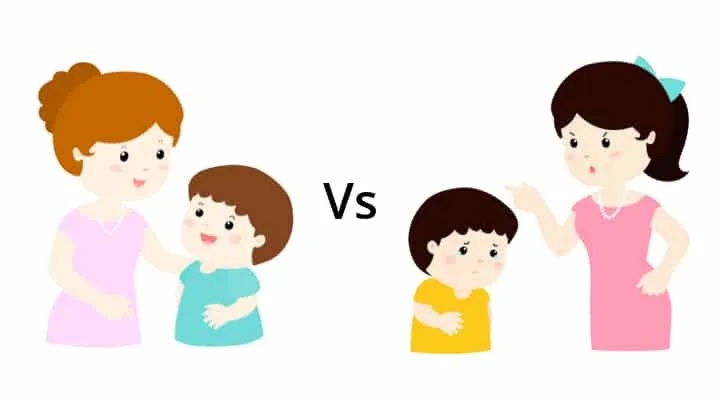Different methods and styles shape how we nurture and guide our children in the complex world of parenting. The two opposing parenting styles, authoritative and authoritarian, are frequently discussed and debated.
These two approaches provide various viewpoints on discipline, communication, and the whole parent-child interaction.
While their names may appear to be identical, there are substantial variances that can have a significant impact on a child’s growth and well-being.
This article explores the differences between authoritative and authoritarian parenting, their consequences on children, and the significance of adopting a balanced approach that provides a healthy and supportive environment for our children.
So, let us go on this voyage of exploration and meditation, unraveling the nuances of parenting styles and their significant impact on our children’s lives.
Authoritative Parenting Style

Image Source – https://www.verywellfamily.com/
Authoritative parenting is a well-known and respected parenting style noted for its balanced and loving approach. This parenting style combines love, guidance, and fair expectations to foster children’s independence, self-discipline, and positive growth.
Authoritarian parenting is more controlling and demanding, whereas authoritative parenting strives to strike a healthy balance between establishing norms and giving autonomy.
Key Characteristics of Authoritative Parenting:
- Expectations that are clear and consistent: Authoritarian parents establish acceptable rules and expectations that are consistently enforced. These standards give youngsters structure and predictability.
- Warm and Supportive Environment: Parents who practice authoritative parenting show their children warmth, affection, and emotional support, establishing a safe and loving environment.
- Good Listeners: Authoritarian parents actively listen to their children, promote discourse, and validate their thoughts and opinions. They promote open lines of communication and offer problem-solving techniques.
- Encouragement Of Independence: By enabling children to make age-appropriate decisions, take responsibility for their actions, and learn from their mistakes, this parenting style encourages autonomy and independence.
- Overall, authoritarian parents utilize positive discipline strategies such as logical consequences and explanations to teach children about their behavior’s consequences and foster self-control.
Benefits Of Authoritative Parenting For Children:
- Children raised with authoritative parenting had stronger self-esteem, better emotional regulation, and enhanced general mental well-being.
- They acquire good social skills, empathy, and the ability to form healthy connections with peers and adults.
- Authoritarian parenting is related to improved academic achievement because it encourages children to take responsibility for their education and participate in a supportive learning environment.
- Children raised with authoritative parenting grow self-reliant, capable of making wise decisions and accepting responsibility for their actions.
- By enabling children to share their thoughts and opinions, this parenting style encourages critical thinking, creativity, and open-mindedness in them.
Potential Drawbacks
- Finding a happy medium: Finding the appropriate mix between kindness and discipline can be difficult. Authoritarian parents may struggle with consistently setting limits or implementing consequences, resulting in confusion or contradictory messages for their children.
- Parental stress: The authoritative parenting style requires a substantial amount of effort and participation on the part of the parents. The ongoing need for good communication and decision-making can cause stress in parents, especially when confronted with difficult situations or confrontations with their children.
- Encourages Rebellious Behavior: While authoritative parenting normally promotes independence and autonomy, some children may see this freedom as an opportunity to confront or rebel against parental authority. This can happen when limits are not conveyed clearly or regularly enforced.
Also Read – All You Need To Know About Co-Parenting Custody in 2023
Authoritarian Parenting Style

Image Source – https://www.verywellfamily.com/
Stringent rules, high expectations, and a lack of flexibility characterize authoritarian parenting. Parents in this approach impose control and power over their children, expecting complete obedience and devotion to rules.
Characteristics
Authoritarian parents have strict expectations and standards that leave little space for flexibility or discussion. They frequently employ a top-down method, in which the parents determine decisions without regard for the child’s participation. Typically, discipline is harsh and punishing, focusing on punishment rather than teaching and mentoring.
Effects on Children
The authoritarian parenting style can have a variety of implications for the development of children. Among the most common consequences are:
- Low self-esteem: Children raised under authoritarian parenting can acquire low self-esteem and a lower feeling of self-worth as a result of continual control and lack of autonomy.
- Reduced independence: Children’s independence and problem-solving skills development may be hampered by stringent regulations and restricted decision-making possibilities.
- Reduced social competence: As children struggle with assertiveness and dispute resolution, authoritarian parenting can make it difficult for them to develop social skills and create healthy connections.
Potential Drawbacks
- Children’s ability to think independently and make responsible decisions is hampered by severe control and restricted decision-making authority.
- Authoritarian parenting frequently comprises one-way communication, leading to parents prescribing the rules without considering their child’s perspective. This makes it difficult for parents and children to communicate openly and effectively.
- The stress on obedience and punishment can lead to an environment devoid of emotional support and understanding, potentially leading to increased anxiety or terror in youngsters.
Also Read – Healing Wounds: Overcoming Co-Parenting Harassment And Moving Forward
Authoritative Vs Authoritarian Parenting Styles: Key Differences

Image Source – https://www.parentingforbrain.com/
Communication Style:
- Authoritative nature promotes open and two-way communication, with parents actively listening to their children’s points of view and explaining norms and expectations
- Authoritarian communication involves one-way communication in which parents dictate rules without considering their child’s input, frequently utilizing a top-down method.
Discipline Methods:
- Authoritative parenting employs constructive discipline strategies to teach and guide youngsters in developing self-discipline and problem-solving skills.
- Authoritarian parenting control is based on rigorous discipline and punishment, with minimal emphasis on teaching and understanding.
Parent-Child Relationship:
- Authoritative: Establishes a compassionate and supportive relationship with children, establishing trust and mutual respect.
- Authoritarian: A hierarchical relationship in which parents have complete power and authority, resulting in a more distant and authoritarian dynamic.
Which Parenting Style Is Better?
Which parenting style is superior, authoritative, or authoritarian is subjective and depends on various factors. Here are the benefits and drawbacks of each parenting style, as well as aspects to consider while selecting a parenting style:
Also Read – Nurturing Color Learning In Children: A Parent’s Guide
Factors To Consider Before Making A Choice
- Norms and values in culture and society.
- Temperament and demands of each child.
- Personal views and upbringing of the parents.
- The ability of parents to adapt and alter their parenting approach based on the developmental stage of their child and changing circumstances.
- Recognize that parenting approaches can change and evolve over time in response to the child’s development and changing requirements.
How to Implement Authoritative Parenting Style
Implementing an authoritative parenting style involves the following tips for parents:
- Create a friendly and supportive environment where children feel comfortable sharing their thoughts and emotions.
- Engage in meaningful conversations while attentively listening.
- Set explicit expectations and limits. Set realistic norms and standards that are appropriate for your child’s age and development. Communicate these expectations clearly and explain why they are so.
- Encourage independence and decision-making by giving your child opportunities to make choices and solve challenges. Encourage them to be autonomous and to accept responsibility for their actions.
Challenges And How To Overcome Them:
- Maintaining constant expectations and boundaries can be difficult. Communicate and interact with your co-parent or other carers to ensure consistency across multiple situations.
- It can be difficult to strike the perfect balance between allowing independence and retaining sufficient control. Provide limited options and gradually raise responsibility as your youngster matures.
- Resolving conflicts can be difficult. Teach your child good problem-solving skills and encourage open communication to resolve problems respectfully.
Also Read – How a Mother Can Lose a Custody Battle?
How To Move From Authoritarian To Authoritative Parenting Style
- Encourage self-awareness by reflecting on the beliefs, values, and triggers contributing to your authoritarian inclinations. Determine whether you have any underlying anxieties or concerns that are influencing your parenting style.
- Helps maintain open channels of communication with your youngster. Encourage dialogue and communicate your expectations clearly and respectfully. Allow children to express their ideas and opinions.
Conclusion
The road from authoritarian to authoritative parenting is one that needs self-reflection, knowledge, and purposeful effort. Parents can build a positive and respectful connection with their children by practicing empathy, open communication, setting clear expectations, and providing options.
It is critical to remember that change requires time and patience. Adopting an authoritative parenting style can result in healthier parent-child interactions, improved communication, and the development of important life skills in children.



